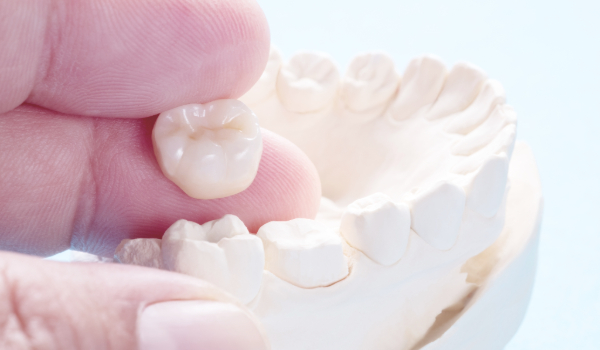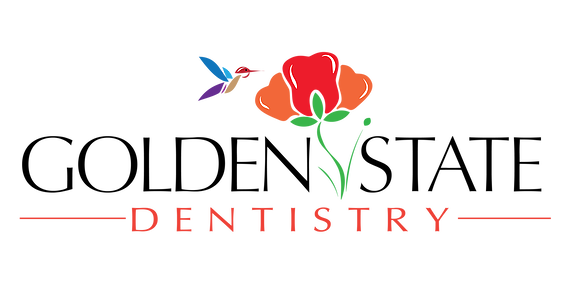
Discover the ins and outs of dental crowns and how they can benefit your oral health.
What are Dental Crowns?
Dental crowns are a type of dental restoration that completely covers a tooth or dental implant. They are often used to restore the shape, size, strength, and appearance of a damaged tooth.
Crowns can be made from various materials, including porcelain, ceramic, metal, or a combination of these materials. The choice of material depends on the specific needs of the patient and the location of the tooth that requires a crown.
The process of getting a dental crown involves several steps. First, your Walnut Creek, CA dentist will prepare the tooth by removing any decay and shaping it to accommodate the crown. Then, an iTero 3D scan of the tooth will be taken and sent to a local laboratory to create a custom-made crown. In the meantime, a temporary crown may be placed on the tooth to protect it. Once the permanent crown is ready, it will be cemented onto the tooth using dental adhesive.
Overall, dental crowns are a versatile and effective solution for restoring damaged teeth and improving oral health.
Benefits of Dental Crowns
Dental crowns offer several benefits, including:
Protection: Crowns provide a protective barrier for weak or damaged teeth, preventing further decay or damage.
Restoration: They restore the shape, size, and function of damaged teeth, allowing for proper chewing and speaking.
Aesthetics: Crowns can improve the appearance of discolored or misshapen teeth, enhancing the overall smile.
Durability: Depending on the material used, dental crowns can be highly durable and long-lasting.
Comfort: Well-fitted crowns can be comfortable and feel natural in the mouth.
These benefits make dental crowns a popular choice for individuals with damaged or compromised teeth.
Types of Dental Crowns
There are different types of dental crowns available, each with its own advantages and considerations. The most common types of dental crowns include:
Porcelain crowns: These crowns are known for their natural appearance and are suitable for front teeth.
Ceramic crowns: Similar to porcelain crowns, ceramic crowns are highly aesthetic and blend seamlessly with natural teeth.
Metal crowns: Made from materials such as gold or silver alloy, metal crowns are known for their strength and durability.
Porcelain-fused-to-metal (PFM) crowns: These crowns combine the strength of metal with the aesthetics of porcelain, making them suitable for both front and back teeth.
Zirconia crowns: Zirconia crowns are highly durable and can withstand the forces of chewing, making them a popular choice for molars.
The choice of crown material depends on factors such as the location of the tooth, the patient's budget, and personal preferences. Your dentist will recommend the most suitable type of crown for your specific situation.
The Process of Getting Dental Crowns
Getting dental crowns typically involves multiple steps and visits to your dentist in Walnut Creek, CA. The process may include:
1. Consultation: During the initial consultation, the dentist will examine your teeth, discuss your concerns, take X-rays, and determine if dental crowns are the right solution for you.
2. Tooth preparation: The dentist will prepare the tooth by removing any decayed or damaged portions and shaping it to accommodate the crown.
3. 3D Scan: A 3D scan of the prepared tooth will be taken with iTero to create a custom-made crown that fits perfectly.
4. Temporary crown placement: While the permanent crown is being fabricated, a temporary crown may be placed on the tooth to protect it.
5. Crown placement: Once the permanent crown is ready, the dentist will remove the temporary crown and bond the permanent crown onto the tooth using dental adhesive.
6. Adjustment and final touches: The dentist will ensure that the crown fits properly and make any necessary adjustments for a comfortable bite.
The entire process typically takes a few weeks, with multiple visits to the dentist. Your dentist will guide you through each step and provide care instructions for your new dental crown.
Maintaining and Caring for Dental Crowns
Proper maintenance and care are essential to prolong the lifespan of dental crowns. Here are some tips to keep your dental crowns in good condition:
Practice good oral hygiene: Brush your teeth at least twice a day and floss daily to remove plaque and maintain oral health.
Avoid excessive force: Avoid habits such as teeth grinding or biting on hard objects, as they can damage the crown.
Regular dental check-ups: Visit your dentist regularly for check-ups and professional cleanings to ensure the crown and surrounding teeth are in good condition.
Avoid sticky and hard foods: Minimize consumption of sticky candies and hard foods that can potentially dislodge or damage the crown.
Wear a mouthguard: If you participate in sports or grind your teeth at night, wearing a mouthguard can protect your dental crown.
By following these guidelines and maintaining good oral hygiene practices, you can help extend the lifespan of your dental crowns and ensure optimal oral health.
If you think you may need a dental crown, call our Walnut Creek, CA office to schedule an appointment: (925) 705-7093 or request an appointment by clicking the button below.


.jpg?width=712&name=GSD-Scalloped-Tongue-Causes-and-Treatment-Blog-01.27.2210.21.21%20(1).jpg)











.jpeg?width=425&name=GSD-How-to-Combat-Dental-Plaque-07.22.24-2%20(1).jpeg)



